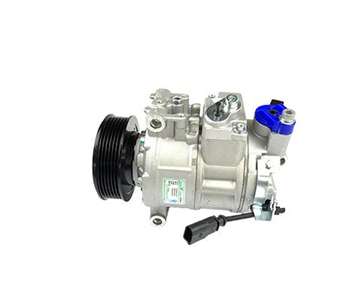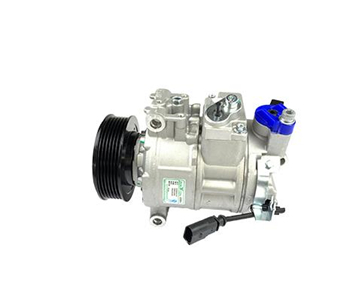
Essential Inspections Before Using Your Auto Air Conditioning Compressor
Keep cool during summer drives with expert-recommended checks for your car's AC compressor. From belt inspections to refrigerant level tests, ensure peak performance.
ZHONGCHENGAs the weather heats up, ensuring your vehicle's air conditioning system is in optimal condition becomes paramount. The Auto Air Conditioning Compressor is a crucial component of this system, responsible for compressing refrigerant and circulating it through the system to cool the air inside your car. Before relying on your AC during those scorching summer drives, it's imperative to conduct thorough inspections to guarantee its functionality and longevity. Let's delve into the essential checks you need to perform before utilizing your Auto Air Conditioning Compressor.
Inspecting Auto Air Conditioning Compressor Belts
One of the primary components ensuring the proper functioning of your Auto Air Conditioning Compressor is the belt that drives it. Over time, these belts can wear down, leading to inefficiencies or even failure of the compressor. Begin your inspection by visually examining the belts for any signs of fraying, cracking, or excessive slack. If you notice any of these issues, it's crucial to replace the belts promptly to prevent damage to the compressor and ensure optimal performance of your vehicle's air conditioning system.
Checking Auto Air Conditioning Compressor Clutch
The Auto Air Conditioning Compressor clutch plays a pivotal role in engaging and disengaging the compressor as needed to maintain the desired temperature inside your vehicle. A malfunctioning clutch can result in the compressor running continuously or not at all, both of which can lead to discomfort and potential damage to the system. To inspect the clutch, start the engine and turn on the air conditioning. Observe the compressor clutch to ensure it engages and disengages smoothly when the AC is turned on and off. Any irregularities in this operation may indicate a faulty clutch that requires immediate attention.
Examining Auto Air Conditioning Compressor Refrigerant Levels
Proper refrigerant levels are essential for the efficient operation of your Auto Air Conditioning Compressor. Insufficient refrigerant can lead to inadequate cooling performance, while overcharging can cause damage to the compressor and other components of the AC system. Utilize a pressure gauge to measure the refrigerant levels and compare them to the manufacturer's specifications. If the levels are outside the recommended range, it may be necessary to recharge or evacuate the system to achieve optimal performance.

Assessing Auto Air Conditioning Compressor for Leaks
Leaks in the Auto Air Conditioning Compressor system can result in a loss of refrigerant, compromising the efficiency and effectiveness of the AC system. Conduct a thorough inspection of the compressor, hoses, fittings, and connections for any signs of leakage, such as oily residue or visible cracks. Utilize UV dye or leak detection tools to pinpoint any elusive leaks that may not be immediately apparent. Addressing leaks promptly is crucial to prevent further damage to the compressor and ensure uninterrupted cooling performance.
Testing Auto Air Conditioning Compressor Operation
Before relying on your vehicle's air conditioning system, it's essential to verify that the Auto Air Conditioning Compressor operates as intended. Start the engine and turn on the AC to its maximum setting, allowing the compressor to cycle on and begin cooling the air inside the vehicle. Pay close attention to the airflow and temperature coming from the vents, ensuring they reach the desired levels within a reasonable timeframe. Any delays or inconsistencies may indicate underlying issues with the compressor or other components that require attention.
Cleaning Auto Air Conditioning Compressor Components
Over time, dirt, debris, and other contaminants can accumulate on the Auto Air Conditioning Compressor and its associated components, hindering performance and potentially causing damage. Regular cleaning of these components is essential to maintain optimal efficiency and prolong the lifespan of the compressor. Use compressed air or a soft brush to remove any debris from the compressor, condenser, evaporator, and surrounding areas. Additionally, consider using specialized cleaners to dissolve stubborn deposits and ensure thorough cleaning.
Conclusion
Your vehicle's air conditioning system, powered by the Auto Air Conditioning Compressor, plays a crucial role in keeping you comfortable during hot summer days. By performing regular inspections and maintenance tasks, you can ensure that your compressor operates efficiently and reliably when you need it most. From checking belts and clutches to inspecting refrigerant levels and detecting leaks, each step in the inspection process contributes to the overall performance and longevity of your AC system. Don't wait until the sweltering heat arrives—take proactive measures now to ensure your Auto Air Conditioning Compressor is ready to keep you cool on the road ahead.
-
Why does the Auto Air conditioning compressor have abnormal noises during use
 2021-11-29
2021-11-29
-
What are the common failures of Auto Air conditioning compressor
 2021-11-29
2021-11-29
-
What should be paid attention to when handling refrigerant in Auto Air conditioning compressor
 2021-11-29
2021-11-29






